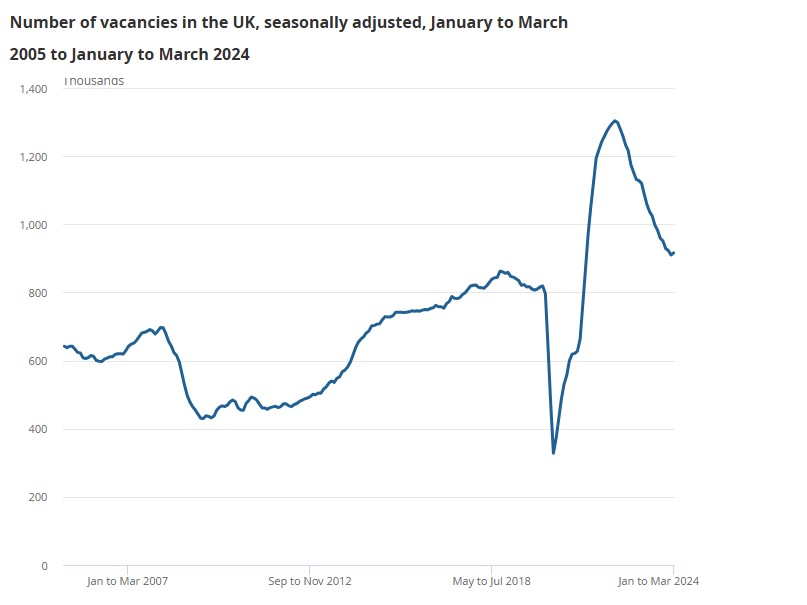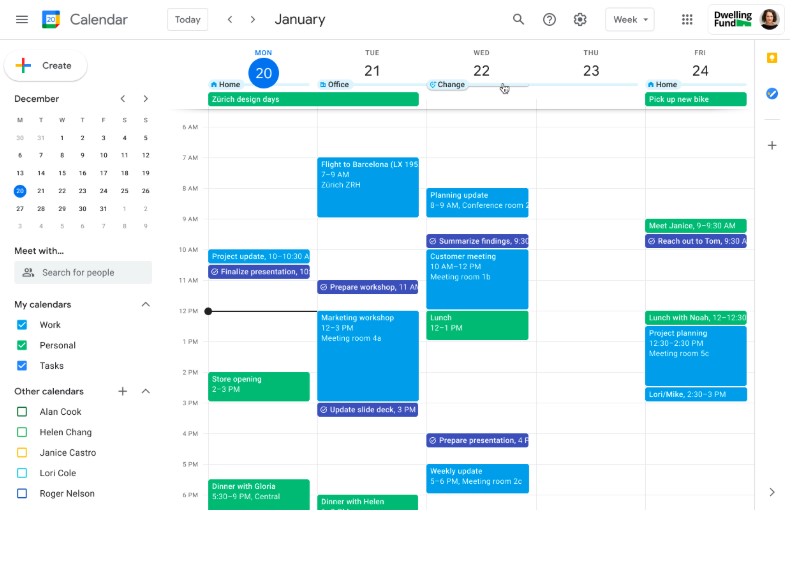Are you confused as to how to manage committment to your current role, with your inate crave for growth and new challenges? Here’s the answer; In this post, ‘Balancing work and Job Search UK Advise’ you would learn all you need for a well-balanced career.
You probably wonder why it’s so tough to juggle your job search with other responsibilities. Or how creating a structured plan like complete with time blocks for applications, interview prep, and LinkedIn updates, helps you stay on track.
Well, discrete moves like updating your profile quietly and scheduling interviews outside office hours are game-changers.
Job searching while employed UK demands both stealth and strategy. So, buckle up as you get tips for working and job hunting, legal pointers, and motivation hacks to make your next career move smoothly and effectively
Why Balancing Job Search with Work Is Challenging

Source: ONS
Balancing a full-time role and searching for new opportunities can feel overwhelming. You are not the only one juggling tasks at work while carving out time for applications. You face tight deadlines, constant focus shifts, and sleepless nights.
At the same time, you worry about keeping your search under wraps. It’s a tricky dance between professionalism and ambition.
According to the office for national services, there is about 916,000 UK job vacancies, down 1.4% from Q4 2023.
That said, you also want to improve work-life balance, so you don’t burn out before landing interviews
This is why you need a strategy to manage both without burning out. Simply put, understanding the challenges is the first step toward success. You need more than energy you need the best career advice for job seekers in the UK to keep your applications sharp
Balancing work and job search UK advice starts with honest reflection on what’s really draining you and then taking action.
The Emotional Toll of Juggling Two Responsibilities
Picture this: you’re drafting a report at your desk when your mind drifts to an email from a recruiter. Suddenly, you feel guilty for daydreaming about your next role.
That emotional tug-of-war is all too real. Have you noticed how trying to stay engaged in your current work while mentally prepping for interviews can make you feel scattered? It’s not just stress, it’s anxiety.
Some people have to manage workplace conflict in between all of that as well. Among those reporting workplace conflict, 42 percent felt exhausted often over the past year. And that fatigue bleeds into your job-hunt focus.
Unmanaged pressure can lead to burnout or mistakes at both ends. Job searching while employed UK demands extra emotional resilience. And to cope, you need clear routines and support systems.
Acknowledging your feelings is the first step. Then, you can set boundaries, practice mindfulness during breaks, and remind yourself that your efforts today are investments in your future.
Common Mistakes When Job Hunting While Employed
Balancing work and job search uk advise is not complete without examining common mistakes to avoid.
Many job seekers make the simple error of timing applications poorly like sending resumes when their boss is most active, for instance, which raises red flags.
Another mistake is oversharing on social media. Even if you think your profiles are private, colleagues can spot subtle hints. Then there’s the trap of neglecting your current role: missed deadlines or decreased output. Don’t do that! You risk damaging your reputation.
Staying discreet is part of discreet job search advice UK. Keep your LinkedIn tweaks hidden, submit applications outside office hours, and maintain high performance at work. By doing so, you avoid jeopardising your current job while pursuing new opportunities.
Legal and Ethical Considerations in the UK
In case you might be asking yourself: “What does UK employment law say about job hunting?”, then you might need to keep reading.
Technically, your contract doesn’t prohibit looking. However, misuse of company time or resources, like using office computers for applications, can breach policy.
Remember: confidentiality clauses may restrict sharing proprietary information with potential employers. And if you hold sensitive data, copying it elsewhere could lead to legal trouble. Switching jobs without quitting requires you to respect non-compete agreements and notice-period terms.
The good news is that most UK contracts allow quiet job searches, so long as you don’t conflict with your duties. If you’re unsure, seek discreet advice from a legal mentor or HR consultant to stay on the right side of the law.
Read Also:
Time Management Tips for Job Seekers

Source: AI
Time is your most precious resource when balancing work and job search UK advice. You need to plan carefully so that you maintain high performance at your current role while making steady progress on applications.
You don’t want to burn out or get sick while juggling the two. UK employees lost 148.9 million working days to sickness or injury in 2024; an average of 4.4 days each, so guarding your energy is crucial.
By creating clear schedules, using tools effectively, and setting aside dedicated time for job hunting, you can reduce stress and increase productivity.
Here are 3 smart tactics you can start using today to find time to job hunt without sacrificing your day job. Let’s get to it.
Creating A Job Search Schedule Around Your Work Hours
Balancing work and job search uk advise? You’re not set without a clear schedule to work with.
First map out your typical workday and pinpoint windows when you can safely focus on applications. Early mornings, lunch breaks, and evenings often work best.
Here’s a clue: set aside a consistent 30-minute block each weekday morning to scan job boards or tweak your CV.You can use clockwise for this Keep in mind, 2024 saw UK hires happen fast about 28 days from application to offer on average, so your timing matters.
Then, schedule a second 30-minute session after dinner for follow-ups or interview prep. By batching tips for working and job hunting tasks into dedicated slots, you avoid odd, distracting check-ins.
Blocking out your mornings to follow steps on staying organised and motivated during your job search can keep you on track.
Remember: consistency is key. With this, you set with a routine that respects both your employer’s time and your career growth.
Maximising Weekends and Early Mornings
Your weekends can be powerful allies. Instead of sprawling chores, carve out an hour on Saturday or Sunday morning for deep-dive tasks: customising cover letters, networking on LinkedIn, or practising interview answers.
This is the part where you build momentum without interrupting work obligations. Similarly, early mornings, when your mind is fresh are golden time for strategic planning. Those quiet hours yield breakthroughs more than rushed evenings.
This approach also lets you maintain work–life balance. Remember: don’t let weekend hunting turn into weekend stress. Keep it structured, short, and goal-oriented.
Using Productivity Tools To Stay Organised

Source: Google Calendar
First, use a calendar app like Google Calendar to block out your job-hunting sessions. Label them clearly so you stick to the schedule.
Next, try a task manager such as Trello or Asana to track each application stage. You’ll know at a glance which jobs you’ve applied for, which need follow-up, and which deadlines loom.
Then use a distraction blocker like Freedom to pause social media during your focused slots. By integrating these systems, you’ll streamline how to find time to job hunt and reduce mental clutter. The goal is to work smarter, not harder.
See Also:
Keeping Your Job Search Discreet
Discretion can make or break your search when you’re balancing work and job search UK. If colleagues or managers catch wind, your current role could be at risk.
Thankfully, there are simple steps like private LinkedIn tweaks and careful interview scheduling that help you pursue opportunities while keeping a low profile.
In the next sections, we get to cover updating LinkedIn discreetly, stealth interview tactics, and what to do if your employer finds out, together. Stay tuned.
Updating Your LinkedIn Privately
Do you see how huge this is? A sudden flurry of profile updates can alert your network.
Instead, go to Settings > Visibility and switch off “Share profile edits.” Then make your changes in private: polish your headline, tweak your summary, and add recent achievements, all without sending notifications.
Afterwards, you can slowly re-enable selected updates for key connections. Another trick: engage with industry content subtly, like liking posts late at night.
This way, you’re showing activity without tipping off your manager. Updating LinkedIn discreetly ensures you build your personal brand quietly and strategically.
Handling Interviews Without Raising Suspicion
Request early-morning or late-afternoon slots. That way, you can travel before or after work. If you must interview during work hours, book a “personal appointment” or “private commitment” in your calendar.
Note: avoid saying “job interview” in written invites.
Plausible cover stories keep your search under wraps. Finally, thank your manager in advance for understanding, this builds goodwill and keeps suspicion at bay.
How To Respond If Your Employer Finds Out
You’re balancing work and job search UK advise then your employer finds out. Whats next? Response is the key!
So what’s the point? Even with care, your boss might learn you’re hunting. If that happens, stay calm. Acknowledge their concerns and reassure them you remain committed until departure.
Here’s why: acting defensively can damage professional relationships. Emphasise that you’ll give proper notice and help train replacements. Offer to schedule transitional handovers to mitigate disruption.
With this, you preserve your reputation and future references. If the relationship sours, at least you’ve left on as good terms as possible. After all, you never know when you may cross paths again.
Check Out:
Strategies to Stay Motivated During the Job Hunt
Job searching alongside a full-time role can feel like a marathon with no finish line.
Here’s how to keep your energy up:
- Set clear milestones
- Celebrate each achievement
- Lean on mentors or peers when motivation dips.
These are tips for working and job hunting that will keep you energized and on track from start to finish, helping you create a career change action plan and stick to it.
Tracking Progress With Realistic Milestones
Create a visual tracker like a spreadsheet or a Kanban board and list each application stage: research, application sent, interview, offer. Assign dates to each milestone.
One tip is to set career goals and achieve them through weekly targets that keep you motivated.
For example, “By May 10: submit five tailored CVs.” Then check off targets as you hit them. Seeing progress on paper is surprisingly motivating.
It helps you spot bottlenecks, perhaps you’re applying too slowly or prepping interviews too late. Balancing career and job search demands requires measurement. With clear metrics, you’ll feel more in control and less prone to doubt.
Celebrating Small Wins
Do you know what I’m tired of hearing? That only offers count as wins. That’s not true!
Every task you complete, revising your CV, networking with a recruiter, or nailing a mock interview is worth celebrating.
For instance, treat yourself to a favorite coffee after sending three applications, or enjoy a short walk after each interview. These mini-rewards boost morale and help you power through tougher stages.
The journey is long, and switching jobs without quitting takes patience. Recognising small achievements keeps your momentum strong and your confidence high.
Seeking Support From Mentors and Peers
In other words, you don’t have to do it alone. Reach out to former colleagues, career coaches, or trusted friends. Share your goals and ask for feedback on your CV or interview technique.
You might even join a dedicated job-search group; online or in person, where members exchange leads and encouragement.
Here’s another way to think about it: accountability partners can prompt you when motivation lags and celebrate your progress alongside you.
By staying connected, you gain insights, broaden your network, and find emotional support. Discreet job search advice UK often emphasises quiet work but collaboration can be quietly powerful.
See Also:
- How to Optimise Your CV To Get Interviews In The UK
- How to discover career pathway and why it counts

If you want to stay of the hassle of juggling between your current role and applying to a new one, APPLYBUDDY is your best bet.
We take off the stress from your shoulder and grant you a smooth ride to your interview phase. Your job search can be a jolly ride when APPLYBUDDY takes over
FAQs: Balancing Work and Job Search UK Advise
1. Can I job hunt while working full-time in the UK?
Yes. UK contracts generally allow you to look for new roles, so long as you don’t misuse company time or resources. Be discreet, respect notice periods, and avoid conflicts of interest.
2. What’s the best time to schedule job interviews discreetly?
Early mornings or late afternoons work best. Alternatively, request a “personal appointment” during lunch or schedule interviews just before or after work hours.
3. How do I avoid burnout during a job search?
Set realistic schedules, track progress, and celebrate small wins. Use mindfulness techniques during breaks and lean on mentors or peers for support.
4. Should I tell my current employer I’m job searching?
Only if you feel the relationship is solid and you need their support. Otherwise, maintain discretion until you secure an offer and are ready to provide notice
